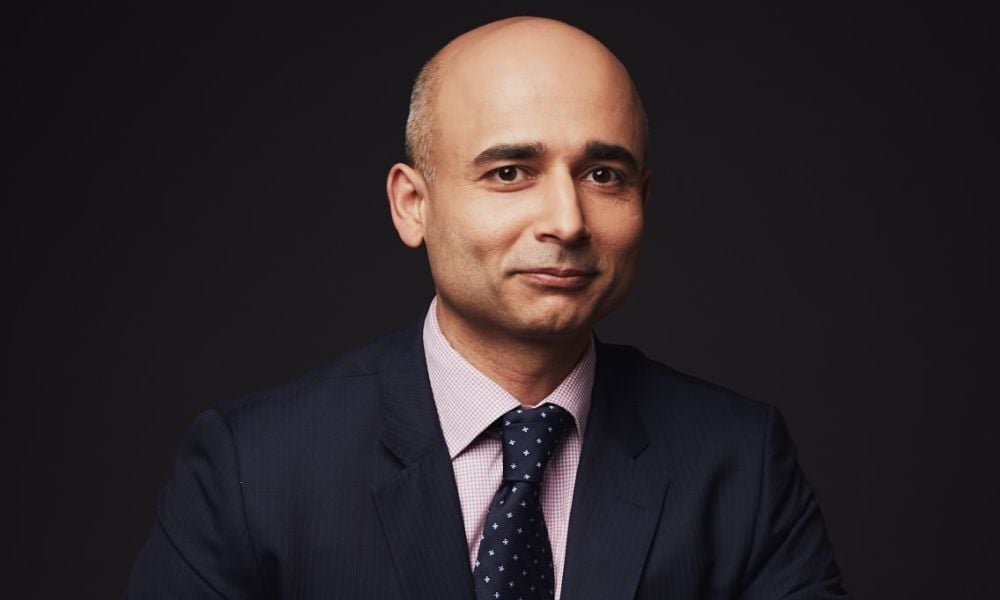Zaman says integrating his M&A group with other departments is his proudest achievement so far

Serendipity and career path often intertwine – which is how Kashif Zaman finds himself helping steer the ship as vice-president, legal at the Toronto-Dominion Bank.
Called in Ontario in 2002, Zaman articled at Torys LLP, then joined Sullivan & Cromwell LLP, known for the intensity of its work ethic, in New York.
“I did corporate work at Sullivan, and it was a very good experience,” he said. “Also, having survived the demanding culture there for four years, I was ready for almost anything.”
Zaman’s next stop was Osler, Hoskin & Harcourt LLP, where he rose to partner and eventually spent 14 years.
“I started off doing a broad-based corporate and securities practice, but in my fifth or sixth years, began working more and more with banking clients, including TD,” he said. “Over time, I developed considerable industry expertise.”
TD noticed.
“I wasn’t looking to make a change, but TD was a good client, and I felt I should talk to them when the opportunity – a unique one because it’s the kind of job that’s much more common in the US than it is in Canada – came up,” Zaman said. “And the more I talked to them, the more excited I became because the position presented an excellent opportunity to learn and grow in a way that I couldn’t in private practice.”
What appealed to Zaman was the extent to which going in-house at TD would “embed” him in business and corporate decision-making.
“In-house lawyers have a seat at the table, so they get to see the decision-making process, the business drivers and the enterprise risk,” he said. “They also get to give strategic as well as legal advice, which means they provide solutions to problems and aren’t confined to offering technical legal answers.”
In-house counsel, Zaman observes, are also “guardians and enablers” at their organizations.
“We assess the acceptability of legal risk in terms of whether business objectives can be achieved. And we are the ones who are ultimately accountable even if we are getting advice from external counsel.”
This is not to say that in-house counsel don’t also perform the traditional advocate’s role.
“We negotiate, and we present the bank’s position to counterparties regularly,” he said.
More particularly, Zaman advises on mergers and acquisitions, including strategic investments. He also has responsibilities for subsidiary governance and TD’s securities business, ESG, and has the organization’s senior complaints office reporting to him.
“I’m always doing a different thing, and every day seems to present a new challenge,” he said.
The “mere stress of change,” Zaman recalled, was the biggest challenge to moving in-house after 19 years of private practice.
“I had to figure out a new formula for success in the in-house setting and how to inspire confidence from senior business leaders who have been at it for 30 or 40 years. It took me about six to nine months to get fully comfortable.”
Zaman credits Jane Langford, now TD’s general counsel, with facilitating his onboarding.
“Jane made sure I met the right people, became aware of the right policies, and was invited to the right meetings,” he said. “Now that I’m comfortable, I recognize the importance of helping others through their transition.”
Throughout, Zaman’s overriding objective has been to generate confidence in the legal department from different stakeholders who often have varying priorities.
“I haven’t achieved that 100 percent, but it’s very important that in-house clients see me as a trusted adviser who gives solid, practical guidance, understands the issues, synthesizes complex problems and works out pragmatic solutions,” he said. “The nice thing about that is what I enjoy most is working and integrating with people – especially smart people who push me to find better solutions.”
With five direct reports, teamwork is a priority for Zaman.
“Motivating and incentivizing people in-house requires a lot of attention because individuals have different work habits, motivations and career goals,” he said. “It’s a little different at law firms because there’s more of a ‘either you fit in, or you go elsewhere’ mentality.”
Surprisingly, Zaman sees many similarities in the lifestyle impacts of being in-house compared to private practice.
“There are a lot of peaks and valleys in private practice. In-house has fewer peaks, but there are no valleys because there’s always stuff going on.”
A few challenges will stand out for the legal department in the future.
“Workload management for the team is critical because it’s been so hectic,” Zaman said. “We’ll never reach perfection, and it’s always a work in progress, but we’re instituting things like creating cross-teams and functional training that lets people help out those who have overcapacity.”
The team also focuses on what Zaman calls “contingency planning and playbooks.”
“It’s a way of preparing for things that don’t happen very often but occur more often than you want them to.”
Finally, managing legal risks is a key priority.
“We’re in a constantly evolving market,” Zaman said. “For example, who would have thought that Silicon Valley Bank would collapse and impact so many things, including regulatory changes and interest rate decisions?”
Zaman’s proudest achievement is the extent to which the legal department’s M&A team has integrated with the bank’s corporate development team.
“We’re true partners, where they have confidence in us, and we look after them. It’s a great plus to work at a place where team culture and environment are important – after all, in my view, 90 percent of job satisfaction comes from the people with whom you work.”
And if the opportunity to grow was a governing criterion in Zaman’s move in-house, it couldn’t have worked out better.
“I’ve learned more in the last four years at TD than I did in the last 10 in private practice,” he said.










